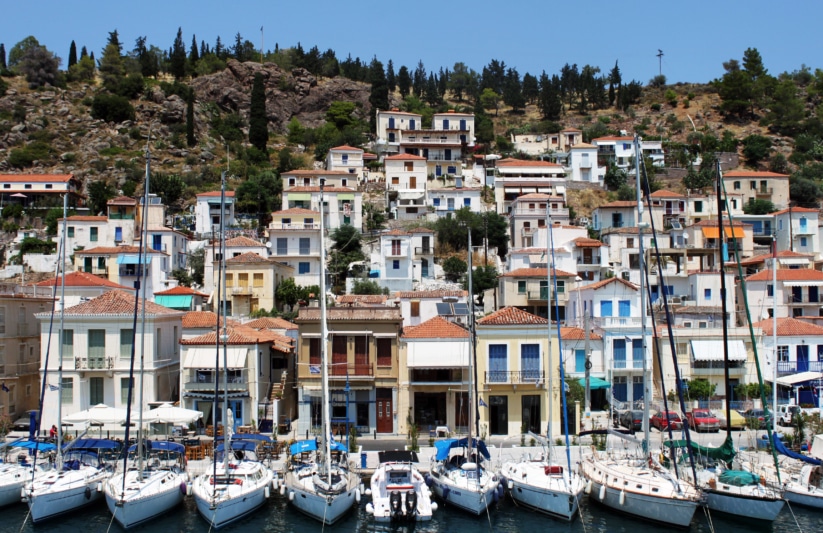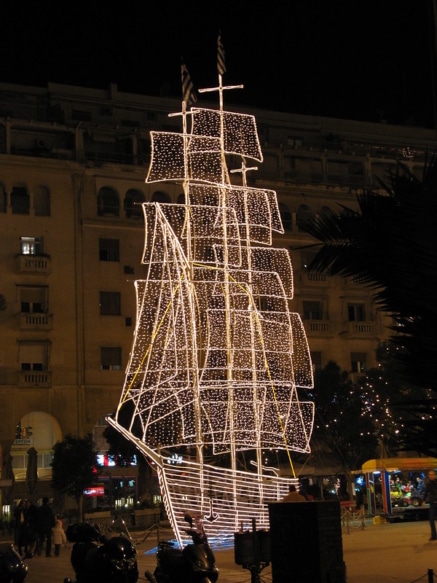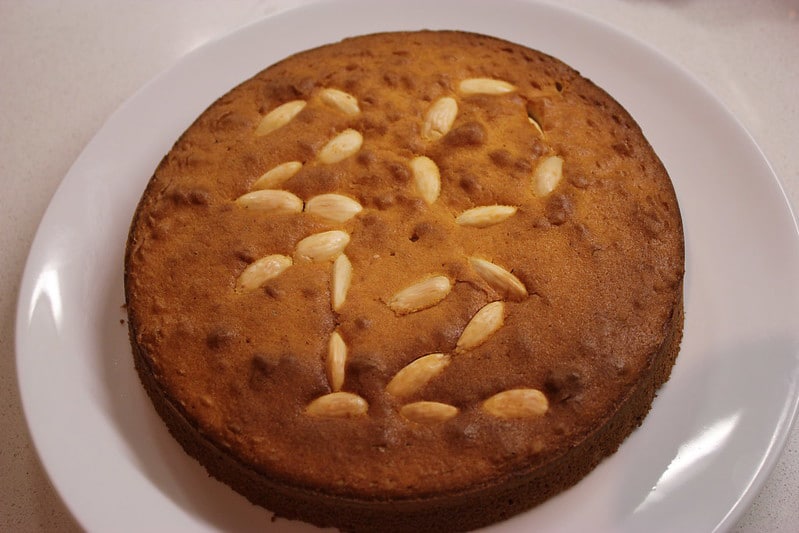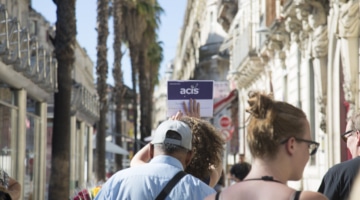Christmas Time in Greece

ACIS Tour Manager Dimitra Neonakis describes the wonderful sights, sounds and smells of the Greek Christmas season.
The smell of Christmas comes to every Greek home in late November, when bakeries begin selling the quintessential holiday cookies called Kourabiedes and Melomakarouna. They are baked once a year and are the kick-off to the holiday season, which in Greece is from December 25 to January 6, and comprises three holidays: Christmas, New Year’s and the Epiphany. This is the season all children look forward to as it means no school for 2 weeks, loads of presents and lots of delicious food.
Greeks celebrate the birth of Christ in their own special way, with some customs similar to those in the rest of the Christian world, and others uniquely Greek. Since ancient times, Greeks have had a very close relationship with sailing and the sea, so until recently, the spirit of the season was expressed in decorating a boat rather than a Christmas tree. Families had a miniature boat in their homes with lights strung across the masts, a tradition still held in cities across Greece, notably the second largest city in Greece, Thessaloniki, where today one can still admire a large boat in its central square instead of a tree. Nowadays, the northern European tradition of decorating a tree has taken over for the most part, but one can still see these boats in squares and homes across the country.

Tilemahos Efthimiadis
December 25 is a day for family and close friends to gather and share a Christmas meal, usually roast lamb, pork or turkey with all the trimmings. It wouldn’t be a Greek meal without countless side dishes including spinach and cheese pies, salads, chestnut cake for dessert and loads of wine. A loaf of Christopsomo (Christ’s bread) is usually placed in the center of the table, as a reminder of what this day is a celebration of.
Christmas and New Year’s Days are a time when children go house to house singing Christmas carols (kalanda in Greek). Groups of friends walk through their neighborhoods playing triangles (musical instruments) and singing a repertoire of traditional songs in exchange for a few coins or a Christmas cookie.
Explore ACIS Greece Itineraries
This period is also the time to visit friends and relatives, and as Greeks would never dream of showing up at someone’s home empty-handed, small gifts are exchanged throughout the season. The most common gift is a gouri, or a good luck charm. This could be a small silver or metal representation of a pomegranate, a mati (evil eye) or an olive branch wreath, all symbols of good portent for the coming year. Nowadays, every jewelry store in the country sells variations of these symbols on necklaces and bracelets, which make popular gifts, especially for women.
Santa Claus is called Ayios Vassilis (Saint Basil) in Greek, and he comes bearing gifts not on Christmas Day but rather on January 1, his feast day, which of course coincides with New Year’s Day. The day is celebrated across the country beginning at midnight, when families gather for a large meal, and just before the clock strikes 12, they turn off the lights to usher in the New Year. The lights are switched back on at midnight, fireworks are shot off and the New Year’s song is sung. Then everyone sits down to cut the Vassilopita, the New Year’s cake that hides a coin somewhere in its center. The cake is cut into pieces for each guest, including an honorary piece each for Christ and Saint Basil, and everybody digs in looking for the coin. It is said that the one who finds the coin in their piece will be lucky in the coming year. Gifts are then exchanged, and the merriment continues into the wee hours, with adults playing poker and other card games and children sneaking extra dessert and reveling in the fact that there is no bedtime that evening.

Alexander Baxevanis
The following morning, children awake to their gifts from Saint Basil, and households are busy cooking once again, this time for the late afternoon New Year’s meal. Most homes eat pork or chicken with rice on this day. Rice gives a symbolic strong start to the year, as the words for “rice” and “roots” are homophones in the Greek language. Greeks believe that the rice helps “root” the New Year in a positive way. Another tradition on this day is breaking a pomegranate on the floor of the entrance of the home. The pomegranate has been a symbol of abundance and fertility since ancient times, and features in a variety of Greek myths and legends. Today, breaking a pomegranate in the home on New Year’s Day is thought to bring the household and its members prosperity. Similarly, guests entering the home will make sure to walk in right foot first, another assurance of good luck for the year that has just begun.
And finally, the feast of the Epiphany on January 6 marks the closure of the holiday season. It is a celebration of Christ’s baptism by St. John the Baptist, and across Greece is marked by priests performing the “Great Blessing of the Waters”, a symbolic blessing of the sea with a holy cross. The cross is then thrown into the sea, and brave swimmers jump into the freezing waters to retrieve it. The lucky diver receives a blessing from the priest, who then releases a white dove, which symbolizes the Holy Spirit.
The Greek Christmas season is characterized by many other regional traditions as well, but despite the variations one thing is certain: Christmas is one of the most joyful times of the year for family and friends across the country.

FREE 2021-2022 ACIS CATALOG
Browse over 195 educational travel excursions including classic, explorer value trips, leadership, service learning and more.









